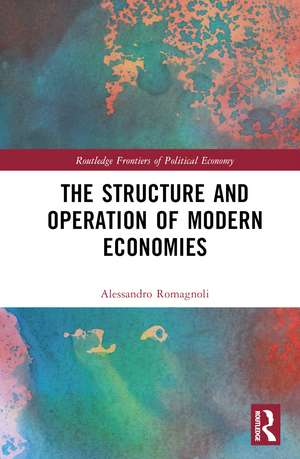The Structure and Operation of Modern Economies: Routledge Frontiers of Political Economy
Autor Alessandro Romagnolien Limba Engleză Hardback – 17 noi 2023
At the centre of the analysis there is the economic system, characterised by organisational components carrying out economic functions (production, consumption, distribution, and establishment and control of the economic activities as well as provision of public goods and services) and by a co-evolving dynamic with the state. The economic system is thus a ‘machine’ that modern states have organised through their laws and international agreements. The book incorporates a historical approach which reveals the varieties, structure and evolution of capitalism as the defining economic system of the modern age. Ultimately, the book demonstrates that the economic sphere and the political sphere are the two powers ruling people’s lives: the economy is the result of their interactions.
This book will be of great interest to readers in political economy, economics, sociology and political science.
Din seria Routledge Frontiers of Political Economy
-
 Preț: 326.49 lei
Preț: 326.49 lei -
 Preț: 312.86 lei
Preț: 312.86 lei -
 Preț: 310.95 lei
Preț: 310.95 lei -
 Preț: 309.79 lei
Preț: 309.79 lei - 9%
 Preț: 867.54 lei
Preț: 867.54 lei -
 Preț: 151.96 lei
Preț: 151.96 lei -
 Preț: 286.98 lei
Preț: 286.98 lei -
 Preț: 310.55 lei
Preț: 310.55 lei -
 Preț: 327.83 lei
Preț: 327.83 lei - 9%
 Preț: 1005.48 lei
Preț: 1005.48 lei -
 Preț: 325.09 lei
Preț: 325.09 lei - 9%
 Preț: 938.47 lei
Preț: 938.47 lei -
 Preț: 310.01 lei
Preț: 310.01 lei -
 Preț: 309.30 lei
Preț: 309.30 lei -
 Preț: 309.90 lei
Preț: 309.90 lei -
 Preț: 310.36 lei
Preț: 310.36 lei -
 Preț: 386.11 lei
Preț: 386.11 lei -
 Preț: 316.03 lei
Preț: 316.03 lei -
 Preț: 295.14 lei
Preț: 295.14 lei -
 Preț: 155.43 lei
Preț: 155.43 lei -
 Preț: 311.41 lei
Preț: 311.41 lei -
 Preț: 152.66 lei
Preț: 152.66 lei - 9%
 Preț: 1005.31 lei
Preț: 1005.31 lei -
 Preț: 281.72 lei
Preț: 281.72 lei -
 Preț: 278.97 lei
Preț: 278.97 lei -
 Preț: 311.61 lei
Preț: 311.61 lei -
 Preț: 356.63 lei
Preț: 356.63 lei -
 Preț: 371.95 lei
Preț: 371.95 lei -
 Preț: 310.95 lei
Preț: 310.95 lei -
 Preț: 324.87 lei
Preț: 324.87 lei -
 Preț: 328.76 lei
Preț: 328.76 lei -
 Preț: 359.03 lei
Preț: 359.03 lei -
 Preț: 329.09 lei
Preț: 329.09 lei -
 Preț: 341.32 lei
Preț: 341.32 lei - 26%
 Preț: 1047.06 lei
Preț: 1047.06 lei - 18%
 Preț: 1169.45 lei
Preț: 1169.45 lei - 18%
 Preț: 1555.17 lei
Preț: 1555.17 lei - 18%
 Preț: 1053.92 lei
Preț: 1053.92 lei - 18%
 Preț: 1059.84 lei
Preț: 1059.84 lei - 25%
 Preț: 767.47 lei
Preț: 767.47 lei - 18%
 Preț: 731.92 lei
Preț: 731.92 lei - 26%
 Preț: 822.54 lei
Preț: 822.54 lei - 18%
 Preț: 1796.21 lei
Preț: 1796.21 lei - 26%
 Preț: 1184.91 lei
Preț: 1184.91 lei - 18%
 Preț: 1120.23 lei
Preț: 1120.23 lei - 15%
 Preț: 700.95 lei
Preț: 700.95 lei - 18%
 Preț: 1116.31 lei
Preț: 1116.31 lei - 22%
 Preț: 299.52 lei
Preț: 299.52 lei
Preț: 1000.27 lei
Preț vechi: 1219.84 lei
-18% Nou
Puncte Express: 1500
Preț estimativ în valută:
191.42€ • 199.60$ • 159.09£
191.42€ • 199.60$ • 159.09£
Carte tipărită la comandă
Livrare economică 20 martie-03 aprilie
Preluare comenzi: 021 569.72.76
Specificații
ISBN-13: 9781138931527
ISBN-10: 1138931527
Pagini: 342
Ilustrații: 144
Dimensiuni: 156 x 234 x 21 mm
Greutate: 0.45 kg
Ediția:1
Editura: Taylor & Francis
Colecția Routledge
Seria Routledge Frontiers of Political Economy
Locul publicării:Oxford, United Kingdom
ISBN-10: 1138931527
Pagini: 342
Ilustrații: 144
Dimensiuni: 156 x 234 x 21 mm
Greutate: 0.45 kg
Ediția:1
Editura: Taylor & Francis
Colecția Routledge
Seria Routledge Frontiers of Political Economy
Locul publicării:Oxford, United Kingdom
Public țintă
Postgraduate and UndergraduateCuprins
Introduction PART I: Emergence, evolution and representation of modern economies 1. The historical pathways to the emergence of modern economies 2. The long-run driving forces behind the evolution of capitalist economies 3. A methodological framework for studying capitalist economies 4. Representation and appraisal of modern economic systems PART II: Structure and operation of modern economies 5. The state: counterpart, partner, and subject of the capitalist economy 6. Production: a transformation process steered by materials, assets, labour, and institutions 7. Consumption: needs satisfaction driven by production and social institutions 8. The market: regulated exchanges allowing capitalist economies operation PART III: The coordination of the economic relations among the states: the global economy 9. The world economy and the coordination of international exchanges 10. The international economic order toward one-dimensional global economy Conclusions
Recenzii
'Many authors have attempted to overcome the well-known methodological shortcomings of traditional mainstream economics: methodological individualism, externalisation of society, abstract rational agents. Romagnoli creates a forceful attempt to overcome these by taking a unique approach, that of systems theory!'
Zoltan Pogatsa University of West Hungary
Zoltan Pogatsa University of West Hungary
Notă biografică
Alessandro Romagnoli is Alma Mater Professor of the University of Bologna (Italy), where he taught economics of the firm, economic development in the Middle East and North Africa and economic system analysis. His research interests encompass productive processes and firm structural evolution in agricultural and industrial sectors, the development process of the Middle East and North Africa and the structure of economic systems.
Descriere
This book is about the economy, rather than economics. It explores the structures, inner workings and problems of modern economies, showing how the organisations and networks that shape the structure of the economy are arranged to provide society with goods and services.
